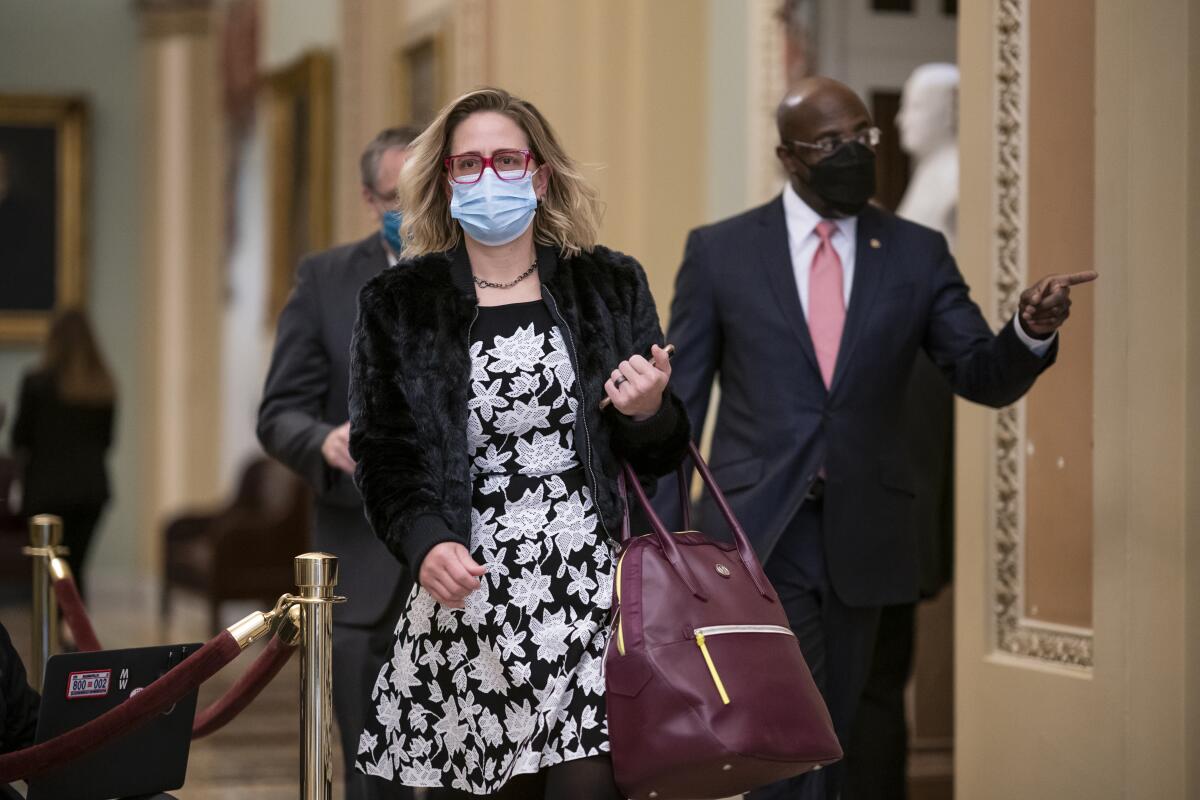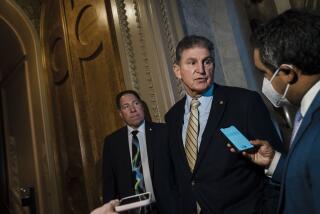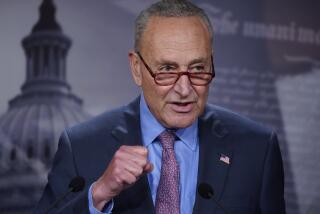Senate clears a key infrastructure bill hurdle as it moves toward a final vote

- Share via
WASHINGTON — The Senate cleared an important procedural hurdle Saturday as it inched toward final approval of an expansive bipartisan bill to rebuild the country’s aging roads, bridges, rail and water systems and electric grid — the culmination of months of negotiation over the first portion of President Biden’s sizable infrastructure proposal.
Called in Saturday after failing to wrap up work late Thursday on the Infrastructure Investment and Jobs Act, senators voted 67 to 27 to advance the measure.
With final passage nearly certain, Democrats had hoped to expedite the process and finish all remaining votes on the bill Saturday. But that effort also failed amid opposition from conservative Republicans who either oppose the bill or insisted on votes on their amendments.
Republicans had suggested a deal could come together later Saturday to schedule more amendment votes, and cited optimism that 18 Republicans supported the latest procedural vote, an increase from prior votes.
“It’s subject to how much time people want to keep holding the bill out,” said Sen. Shelley Moore Capito (R-W.Va.). “The end is already predetermined.”
Democrats view the GOP effort as merely obstructionist and appeared to accept by Saturday afternoon that they would spend the rest of the weekend in session, including another procedural vote Sunday.
“We’re serene about it,” said Sen. Brian Schatz (D-Hawaii).
Reaching no agreement in the evening on expediting amendments and final votes, the Senate adjourned until noon Sunday.
The 2,700-page bill, with a total cost of about $1 trillion in new and previously set spending, would fund the largest-ever federal investment in public transit, the largest investment in passenger rail since the creation of Amtrak, and the largest investment in bridges since the interstate highway system was constructed, according to the White House.
For California and other Western states, the plan would fund more than $8 billion in water infrastructure, including building water recycling and storage facilities.
“We as a country have an infrastructure system that’s badly in need of repair,” said Sen. Rob Portman of Ohio, the chief Republican negotiator on the bill, who warned that China is far outpacing the United States in this regard.
“They’re trying to outcompete us in every way, including having better ports, better rail, better airports, the ability to both buy and sell their products overseas, and we here in America want to be at the top of that list,” Portman said.
The bill has dominated discussion in the Senate for months. Eager for a bipartisan victory, Biden began talks with a group of Senate Republicans in May.
When those negotiations crumbled, he picked up talks with a second bipartisan group of centrists. Biden and Portman, along with the other centrists, shook hands on a framework in late June. That was followed by weeks of negotiation on Capitol Hill on the particulars.
In recent days, with their August recess looming and passage all but assured by wide bipartisan consensus, senators were eager to fast-track final amendment votes and procedural hurdles on Thursday evening. But they left the Capitol at almost midnight as Sen. Bill Hagerty (R-Tenn.), a newly elected conservative, said he wouldn’t agree to speed up the process because he was concerned about the bill’s cost. Senators feared a repeat of that hurry-up-and-wait this weekend.
The plan, which has $550 billion in new spending, includes $110 billion in new funding for roads, bridges and surface transportation projects over the next five years. An additional $73 billion would go to upgrading the power infrastructure, $65 billion to expanding high-speed internet nationwide, and $55 billion to expanding access to clean drinking water.
An additional $8.3 billion would go toward Bureau of Reclamation water infrastructure projects in the West, with much of that expected to go to California-based projects, according to Sen. Dianne Feinstein (D-Calif.).
More than $1 billion would fund water storage at sites such as the Los Vaqueros Reservoir in Northern California. Another $1 billion would fund new water recycling.
The infrastructure bill has many conservative detractors, including former President Trump, who during his administration never followed through on repeated promises for an infrastructure package. He has encouraged Senate Republicans to reject the current plan.
A key point of contention is cost. The bill would increase the federal deficit by $256 billion over 10 years, according to a nonpartisan estimate from the Congressional Budget Office.
“It is clear the ‘pay-fors’ in this package are either phony or insufficient, and this bill is full of K Street carve-outs, kickbacks and pork,” said Sen. Mike Braun (R-Ind.), referring to the many lobbying firms on the Washington street. “Republicans must not support the swamp’s bloated debt bomb parading as an infrastructure deal.”
Portman and the top Democratic negotiator, Arizona Sen. Kyrsten Sinema, note that the official cost estimate doesn’t account for the increased economic efficiency and productivity that the spending is expected to produce.
Many progressive Democrats are also skeptical of the plan, even though they support it. Like their counterparts in the House, they are much more concerned about moving quickly to the separate, broader bill to expand the social safety net, which Democrats hope to pass without the need for GOP support.
Some progressives have characterized bipartisan infrastructure negotiations as narrow and unrepresentative.
Sen. Robert Menendez (D-N.J.) railed against the centrist negotiations on the Senate floor, saying he would never again support a bill that’s not negotiated among a more diverse set of senators.
The centrist negotiating group “had no geographic diversity, no ethnic diversity, no racial diversity — and that’s consequential,” he said.
Still, centrists from both parties, such as Portman and Sinema, have praised the Senate’s ability to work across party lines, suggesting this success might clear a path for additional bipartisan deals.
But the bipartisan spirit is likely to be short-lived.
Senate Democrats plan to immediately turn to a resolution to set up the second part of Biden’s infrastructure plan. The text of that resolution, including how much would be spent in each area, could be released Sunday.
Called the “human” infrastructure plan, the $3.5-trillion package includes progressive priorities such as subsidies for child care, tuition-free community college, additional Medicare benefits and potentially a pathway to citizenship for people in the country illegally.
Because Republicans universally oppose the package, Democrats plan to pass it through a fast-track legislative process that requires a simple majority and doesn’t allow for a GOP filibuster.
Senate Majority Leader Charles E. Schumer (D-N.Y.) has committed to holding a vote on that framework before senators leave for their August recess, though the legislation won’t be written and ready for final passage until they return in September.
In response to progressive Democrats who fear that the Senate won’t be able to pass the second, larger bill, House Speaker Nancy Pelosi (D-San Francisco) has agreed to delay voting on the bipartisan infrastructure plan until the Senate acts on the follow-on proposal.
More to Read
Get the L.A. Times Politics newsletter
Deeply reported insights into legislation, politics and policy from Sacramento, Washington and beyond. In your inbox three times per week.
You may occasionally receive promotional content from the Los Angeles Times.











